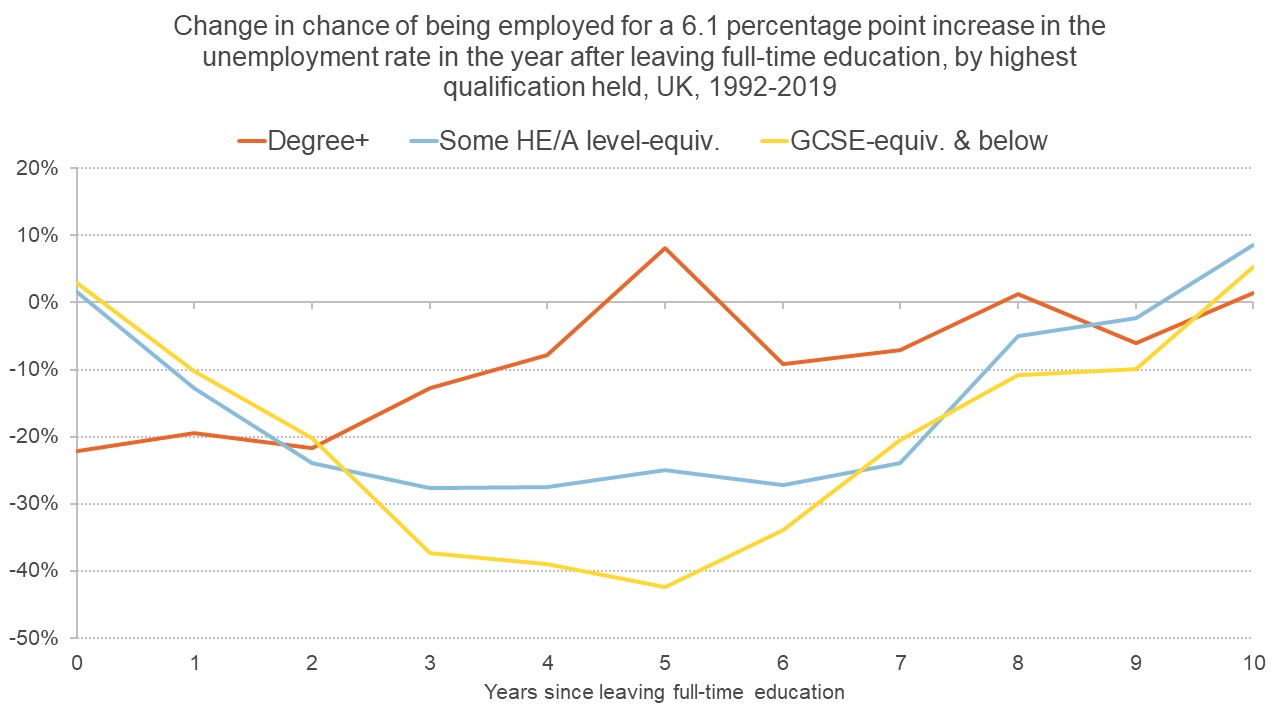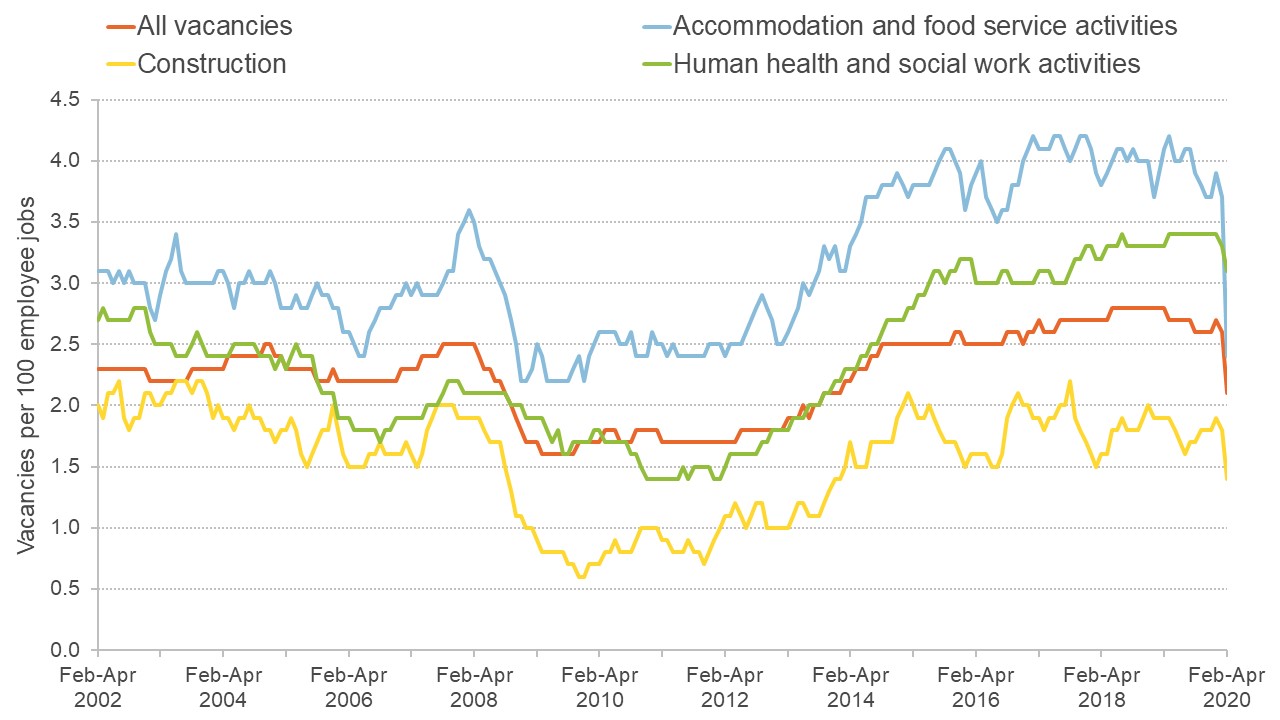The longer that the current slump in economic activity lasts, the more severe we expect its consequences to be for this generation of graduates and non-graduates leaving full-time education at schools, colleges and universities.
The effects of entering the labour marked during a recession extend over the long run, affecting economic outcomes over a period of many years and affecting many other aspects of life, including family formation, health and even longevity. Non-graduate school leavers will suffer the greater losses, but the outlook is not benign even for graduates, who may face low wage growth over many years. We may also see an exacerbation of socio-economic inequalities.
What does evidence from economic research tell us about the effect of past recessions on school-leavers and graduates?
-
According to research on Canada and the United States, graduates finishing their degrees in a recession are more likely to suffer lower earnings due to lower wages and fewer hours of work at entry. The effects last up to 10 to 15 years (Kahn, 2010; Oreopoulos et al, 2012).
-
There are similar results for European countries, including Belgium and Spain (Cockx and Ghirelli, 2016; Fernandez-Kranz and Rodreiguez-Planas, 2018). For the UK, research shows that young people starting their careers in a downturn experience a reduction in real hourly pay of around 6% one year after leaving education, and that their wages do not recover for up to six years (Clarke, 2019).
-
The impact on people’s living standards is smaller, due to the tax and benefit system and income provided by other household members, mainly parents (Cribb et al, 2017).
-
Non-graduate leavers who enter the labour market during a recession suffer even larger long term earnings losses than graduates (Schwandt and von Wachter, 2019) and the effects are felt more in terms of employment than wages (Clarke, 2019).
-
The damaging effects of entering the labour market in a recession may extend beyond economic outcomes, having a negative impact on marriage, divorce, fertility and, in the very long run, even mortality (Schwandt and von Wachter, 2019).
-
The effects on graduate earnings depend on people’s individual characteristics. They are larger for those already predicted to have lower wages (Oreopoulos et al, 2012) and for those graduating in subjects such as art and design that are associated with slower wage growth over subsequent careers (Altonji et al, 2016).
-
The effects may also differ according to family background, with evidence indicating the widening of socio-economic gaps in earnings among UK graduates entering the labour market during the 2008/09 recession (Del Bono and Morando, 2020).
Why is a recession so damaging for new labour market entrants?
During a recession, fewer jobs are available and those that are still vacant might be of worse quality. Employers might be able to bargain hard given that there is an excess supply of applicants and negotiate lower wages or cut back on training and career opportunities.
In general, a spell of unemployment may have both temporary and long-term effects on earnings. The latter constitute what is known as the ‘scarring’ effect of unemployment.
Estimates of the size of this effect vary, but there is consensus among economists that the effect is significant, and it reflects on wages as well as future employment opportunities (Arulampalam, 2001; Gregg, 2008). The scarring occurs not only after a spell of unemployment: holding a job in a low-skilled occupation or an occupation for which the level of qualification obtained is not needed might also affect future earnings.
The scarring effect of a spell of unemployment or a low-skilled job is due to the fact that an individual’s marginal productivity is not observable to employers, and past employment history acts as a ‘signal’. There is also the possibility that being unemployed or employed in a low-skilled job will lead to an actual loss of skills, so that an individual becomes less productive through this experience.
These effects will be larger for younger workers since when they enter the labour market they have accumulated no other work experience that can help signal their productivity.
What should we expect the effects of the current recession to be?
In May 2020, the Office for Budget Responsibility (OBR) published its latest forecast about the impact of the pandemic on UK public finances. According to these projections, unemployment will rise sharply from 3.9% in the second quarter of 2019 to 10% in the second quarter of 2020, with an increase of about 2.1 million to a total of 3.4 million (OBR, 2020).
To put things in perspective, the 6.1 percentage points projected rise in the unemployment rate is twice the size of the increase in unemployment in the 2008/09 recession. After that, unemployment is expected to decrease, but it might not go back until its pre-pandemic levels before 2023.
Using these figures and analysis that compares the employment rates of adjacent cohorts of full-time education leavers from the UK Labour Force Survey, estimates have been provided of the effect of the current recession on the employment and average hourly wage of different groups of full-time education leavers (Henehan, 2020).
The simulations show that two years after leaving full-time education, graduate as well as non-graduate education leavers will be 20% less likely to be in employment than their immediate and more fortunate predecessors. But four years down the line, a huge gap emerges: graduate employment will be lower by 8%, while the employment rate of school leavers with intermediate or low qualifications could be almost 30% or 40% lower, respectively.
Average wages for those in employment might suffer as well. The analysis predicts that two years since entering the labour market, graduates will see their wages cut by 8%, while low qualified non-graduates could see a reduction of about 13%.
Figure 1: The coronavirus effect to unemployment is expected to reduce a low-skilled leaver’s chance of being in work by over a third
Source: Henehan 2020, (analysis of ONS, Labour Force Survey)
These estimates are based on the experience of leavers from full-time education after previous recessions (such as the 2008/09 recession). There is much we can learn from previous experiences, but we also need to be wary of possible differences that may make these predictions more uncertain.
As well as the size of the increase in unemployment being larger this time around, we would expect the effects of this recession to be different because it will affect different sectors of the economy.
The last recession hit banking and finance first and hardest. In contrast, the lockdown imposed to combat the spread of coronavirus was introduced first and will be lifted last in very different sectors of the economy, including non-food retail, transport and hospitality, as well as the performing arts and entertainment.
These sectors are the main point of labour market entry for many young people with low levels of educational qualification. Indeed, data on job vacancies published by the Office for National Statistics (ONS) show that the sector showing the largest quarterly fall in vacancies was ‘accommodation and food service activities’, with a record quarterly decrease of 32,000.
Thus, it is quite possible that this recession will further exacerbate differences between graduate and non-graduate school leavers (ONS, 2020a).
Figure 2: Job vacancies per 100 employee jobs for selected industries in the UK
Source: ONS, 2020
These unequal effects on the prospects of education leavers are substantially driven by their ability to work remotely. It is estimated that only 44% of jobs in the UK can be done from home. The share of jobs in an industries or occupations that can be done at home favours those requiring higher levels of education, ranging from 4% in accommodation and food services and 14% in retail trade, to 76% in finance and insurance, and 97% of those in legal occupations (Dingel and Neiman, 2020).
These low-home-working industries are also characterised by insecure and casualised contracts. At the end of 2019, 23% of those working in accommodation and food were on a zero hours contract (ONS, 2020b). This means that school leavers who do gain a foothold in the labour market are less likely to be protected from interruptions caused by illness (to which their exposure will be higher) or further closures.
What else should we consider?
We should not forget that those still in full-time education will also be affected by the current situation. Recent data from a survey conducted by the Institute of Student Employers indicate that as many as 40% fewer internships and placements might be available over the next year. We already know that 80% of apprenticeships due to start in April 2020 did not do so (Hooley, 2020).
This means that there will be fewer opportunities for current students to accumulate relevant work experience. Non-white students and those from disadvantaged socio-economic backgrounds are usually less likely to participate in these schemes (Delavande et al, 2020). But the gap may widen if the number of placements reduces and students are forced to rely more heavily on personal connections to gain such experience.
A possible individual response to diminished labour market prospects is, and always has been, to continue in full-time education and return to the labour market at a later date. Although it is still uncertain how universities will deliver their courses in 2020-21, they will have much spare capacity due to expected reductions in international student recruitment.
Government backed-loans for tuition fees and maintenance, with future-income-contingent repayment terms, means that prospective undergraduates or postgraduates at higher education institutions could do so with limited financial constraint. (Vignoles, in RES Webinar, 2020).
In contrast, loans for living costs are not available to prospective further education students, and many vocational courses cannot be delivered online. This creates another mechanism in which the options of prospective school leavers aged 16 are likely to be more restricted than those for 18 or 21 year olds.
Where can I find out more?
Class of 2020: education leavers in the current crisis: Kathleen Henehan of the Resolution Foundation proposes government programmes that could address the many challenges discussed above.
Entering the labour market in a weak economy: scarring and insurance: Robert Joyce and colleagues on the effects of entering the labour market during the recession of 2008/09.
A bad time to graduate: IFS director Paul Johnson.
The European Economic Association is maintaining a list of studies addressing the economic effects of the Covid-19 pandemic using new data. Angelo Martelli at LSE and co-authors’ project, Entering the labour market during a pandemic: scarring effects and youth unemployment, promises to deliver insights for the UK and other countries quickly, and others may emerge.
Who are UK experts on this issue?
Stephen Clarke, Resolution Foundation
Paul Gregg
Emilia Del Bono
Robert Joyce, IFS
Anna Vignoles
Read the original article on the Economics Observatory website here.


